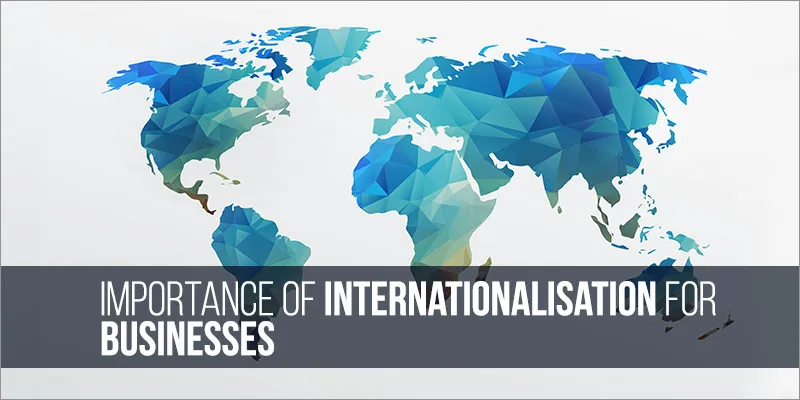Importance of internationalization for businesses: why this can’t be ignored?
As India treads the path to become the fastest growing startup economy in the world, international commercialisation offers an untapped opportunity that can change the trajectory of India’s internet entrepreneurship ecosystem. This potentiallystrong approach opens new horizons for Indian startups to become known as a home-grown internationally acclaimed organisation(s).

By means of its growing popularity, internationalisation has definitely spurred mixed emotions among global influencers, giving birth to diverse schools of thought. Some believe that developed countries, such as Canada and West Europe, offer the necessary growth drivers, thus, becoming the first choice for internationalisationand simultaneously creating weak ground for the emerging or developing markets. And, then, there are a few who don’t believe so. While the future may unfold the best-fitting answer for this, the path to Internationalisation leads to pertinent questions that need to be addressed promptly. One of these being that in thisdynamic internet landscape, can businesses survive should they adopt a closed market approach? Plus, with ebbing geographic boundaries, is it prudent for an entrepreneur to ignore tapping into developing regions, while planning its growth strategies, during the initial years of establishing business?
However, recent market trends paint a different picturebycanvassing higher growth options in emerging geographies. And this is largely driven by the growth of mobile, which is leading a new wave of consumer revolution. Furthermore, mobile revolution has definitely altered online consumption patternsby shortening the web era by almost a decade. If we talk pure numbers, there are over three billion mobile users in Asia Pacific, and India accounts for almost one third of them. Moreover, as per a research company, Mediacells, India is estimated to add over ~200 million smartphone users this year, surpassing the US in absolute numbers.
Seen as one of the most promising trends, emerging markets are building high momentum by offering umpteen opportunities for scaling startups. Recent deals and expansions prove to be testimony to this. For example, over the past few months, India has become the fastest growing globalmarket for Amazon after only two years of setting up operations. Additionally, theworld’s best startup examples like Uber, AirBnB and BlaBlaCar are actually looking at customizing their business models to suit requirements of various APAC and MEA markets. Further propelling the growth parameters, national and international investors are pouring in capital to smoothen and fasten the expansion process to newer markets. For instance, on the home front, Flipkart, India’s Amazon, challenged Amazon by raising USD 1.2billion over a period of six months, and Amazon further committed USD 2 billion into the Indian market as an answer to that challenge.It indicatesthe rising comfort levels of investors in entering emerging regions; there is no doubt emerging markets cannot be ignored anymore!
Having underlined the opportunities these markets represent, it’s also important to understand the factors that dominate any expansion strategies to newer geographies. A case to consider here! If a startup intends to expand during its formative years, i.e., before their business models mature, there is a likelihood of running into the risk of replicating a costly mistake that can prove to be detrimental to it. On the other hand, if the expansion happens late, companies may end up wasting critical resources fighting or acquiring local players that are clones of their business model (with hopes to cutthroughtheclutter and establish footprint in the target market). Although, the aforesaid can be debated, what cannot be overlooked is the fact that businesses operating on similar business models and ideologies are emerging faster than expected. Undoubtedly,they’re taking away exclusivity from any business model.
On the investment front, institutional investors are also prudently backing proven business models, thus, invariably shrinking the window of opportunity further. For instance, Airbnb leveraged the advantages of being a first mover to the European and Asian Markets against its counterpart Wimdu (a Rocket Internet’s portfolio company). Also, late entrants such as Expedia and Amazon faced difficulty in instituting themselves in the region (and this came at a higher cost as well).
Then comes the next obvious question - what is the ‘right’ time to internationalise, and what are the key elements needed to do it? Global experiences indicate that ‘preparedness’ needs to be inculcated from ‘Day 1’from the very core of the organisation. Going by the latest trends, most founders are encouraging corporate diversity in workforce management strategies with hopes to boost comfort for internationalisation.
Also, while evaluating an internationalisation opportunity, it’s also important to bear in mind that investments with strong capital create winning combination for realising international potential. Undoubtedly, if there is an aggressive player in the region,additional capital investment always provides leeway for local experimentation, cushion for some mistakes and contributes vastly to the war chest.
Last and the most critical ingredient for a successful expansion is the first partner or first hire - and this can actually prove to be a deal breaker. Hence, it becomes imperative to ensure that the first partner or hire shares traits similar to that of the founding team, and, at the same time, needs to be local enough to devise smart on-ground strategies.
To sum it all, emerging markets, given their potential, will top the internationalisation list for all mobile first companies. However, as the window of opportunity shrinks, founders will have to relook their approach and strategies by focusing on building the right culture and management team, being well-capitalised and associating with the right international partners. A consideration of these factors can help businesses potentially alter their ability to globalise.







